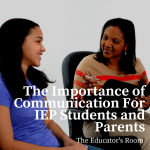 What does it take to effectively teach a student with a learning disability? That’s the million dollar question. But if I could take a stub at it, I would say relationship, relationship, relationship- pure and simply.
What does it take to effectively teach a student with a learning disability? That’s the million dollar question. But if I could take a stub at it, I would say relationship, relationship, relationship- pure and simply.
With all the different theory on best practices, this one seems to be left off the list very frequently. However, I would venture to say that the interpersonal relationship factor between teacher and pupil is more important than the skill set of the teacher. Simply put, without a positive relationship significant learning is unlikely to take place. With it, learning is mostly likely to occur by leaps and bounds in spite of inappropriate techniques, materials or other shortcomings. Teaching in general and teaching of students with special needs in particular requires an affirming teacher-pupil relationship.
Effective teaching requires expert knowledge of curriculum, skills, and methods, but it also requires understanding of the student holistically, his feeling, emotions, and attitudes. The latter must be addressed and acknowledged also. Students with learning disabilities, no matter how they present, often feel lost, frightened, discouraged and frustrated. Many have feelings of hopelessness about the future not only in school, but life.
For twelve long years of school and after, he contends with a situation for which he can find no satisfactory solution. When schoolwork becomes insurmountable, the child has few alternative resources. An adult dissatisfied with his job may seek a position elsewhere or find solace outside of his work; he may even endure these difficulties because of a high salary or other compensations. For a child who fails, however, there is no escape. He is subjected to anything from degradation to long-suffering tolerance. Optimum conditions may lessen the child’s misery, but proof of his inadequacies appears daily in the classroom. In the end, he is held in low esteem, not only by his classmates, [fusion_builder_container hundred_percent=”yes” overflow=”visible”][fusion_builder_row][fusion_builder_column type=”1_1″ background_position=”left top” background_color=”” border_size=”” border_color=”” border_style=”solid” spacing=”yes” background_image=”” background_repeat=”no-repeat” padding=”” margin_top=”0px” margin_bottom=”0px” class=”” id=”” animation_type=”” animation_speed=”0.3″ animation_direction=”left” hide_on_mobile=”no” center_content=”no” min_height=”none”][sometimes by his teachers and] family. (Roswell, 1972)
When I think about the above scenario it puts the issues students with disabilities have with learning in prospective for me. Unlike other students, their academic failure and learning disabilities may negatively influence every aspect of their world. They can’t outrun it. It’s so important for teachers to recognize that as well as the emotional impact failure has on the student overall. Think about it, these students have to live with the fact that their teachers and parents are displeased with their lack of performance. Naturally, many teachers feel frustration by their inability to reach the student. As much as we don’t articulate that, they feel it. Too often they step into our class as failures and leave the same way. The notion that they don’t measure up hangs over their heads relentlessly.
What is a teacher to do?
An important responsibility for teachers is to motivate students who have been failing, to build their self-concept and self-esteem and to interest them in learning. This takes work! But it’s necessary work to enhance the student’s feelings of self-worth, and rekindle his interest in learning.
Where does a teacher start?
Developing a good relationship between the teacher and student is the first step. Rapport has to be established if a teacher will be able to impact a student’s life beyond the objectives she teaches. Teachers will have to accept and respect the student- the good, bad and the ugly. She will have to have compassion without over-involvement, understanding without indulgence, and a genuine concern for the student’s development.
I didn’t say this was going to be easy, but I truly believe that for many students this is the missing link. Whenever I am asked to give advice to teachers, my first piece of advice is to build rapport with each student. As the adage goes, students “don’t care how much you know until they know how much you care.” Students will come to your class and try their absolute best because they like you. We must capitalize on that by helping them to meet with success early. Chances are the more success they experience the more they are willing to continue to work hard in addition that same success will start to have a positive impact on their personality.
Here are some suggestions to building a relationship with students:
- Talk to them about their disability. I think we all would be surprise at the few teachers who actually acknowledge to the student that they know they have a disability and need extra help. It’s usually unspoken, but it shouldn’t be.
- Have a conversation with them about their strengths and weakness in your class. Ask them to identify them for you. You should also let them know your ideas for using their strength to compensate for their weaknesses in your class.
- Give the student an opportunity to have input in your lesson. You could allow them to determine how they will be assessed. You may allow them to determine what materials are used.
- Provide structure and establish routine, but don’t be so inflexible that things can’t change depending on the situation and circumstance.
- Don’t be afraid to have different expectations for students. Chances are if you have a student with ADHD and your class is an hour and half, the two just don’t mix. There was one student that needed to leave my room every day; however, the overall expectation for students was that they could only have two restroom passes a week. For my sanity as well has his, he was allow a 15 minute break when he finished at least half of his assignment. The other students didn’t mind they were able to see how much of a distraction he could be on occasions.
- Be sincere with your students. Student can detect dis-honesty a mile away. Don’t tell them they are doing better than what they are. Instead, minimize their anxiety by letting them know that many students have difficulties, but together you will help them find ways to overcome them.
- Help them establish goals for your class and not just the goal of “I want to pass.” As much as possible you want goals you know you can help them achieve with all things considering.
- Call home with good reports just because. Find something to report to their parents. Even if its that you are proud of them for coming to class.
Do you have other ways that teachers can build rapport with students?[/fusion_builder_column][/fusion_builder_row][/fusion_builder_container]



